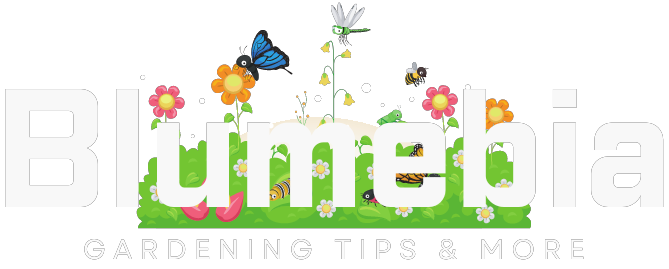Garden mulch plays a vital role in maintaining a healthy and thriving garden. It helps regulate soil temperature, retain moisture, suppress weeds, and improve soil structure as it breaks down. With a variety of materials available, from organic options like wood chips and straw to inorganic choices like rubber and gravel, gardeners can select the type that best suits their needs and aesthetic preferences.
When considering mulch, we should pay attention to factors such as the type of material, intended use, and application depth. Organic mulches, for example, enrich the soil as they decompose, while inorganic mulches may require less maintenance over time. It’s also crucial to think about the specific plants we are mulching around, as some materials can affect soil pH or moisture retention differently.
With so many choices available, we can ensure a good investment in our garden by evaluating these aspects. In selecting the best garden mulch, we can enhance our gardening experience while promoting the health of our plants.
Best Garden Mulch
We have compiled a selection of the best garden mulch options available. These products are designed to enhance soil health, retain moisture, and suppress weeds, making them essential for any garden enthusiast. Explore our top picks to find the right mulch for your gardening needs.
GardenStraw by HealthiStraw
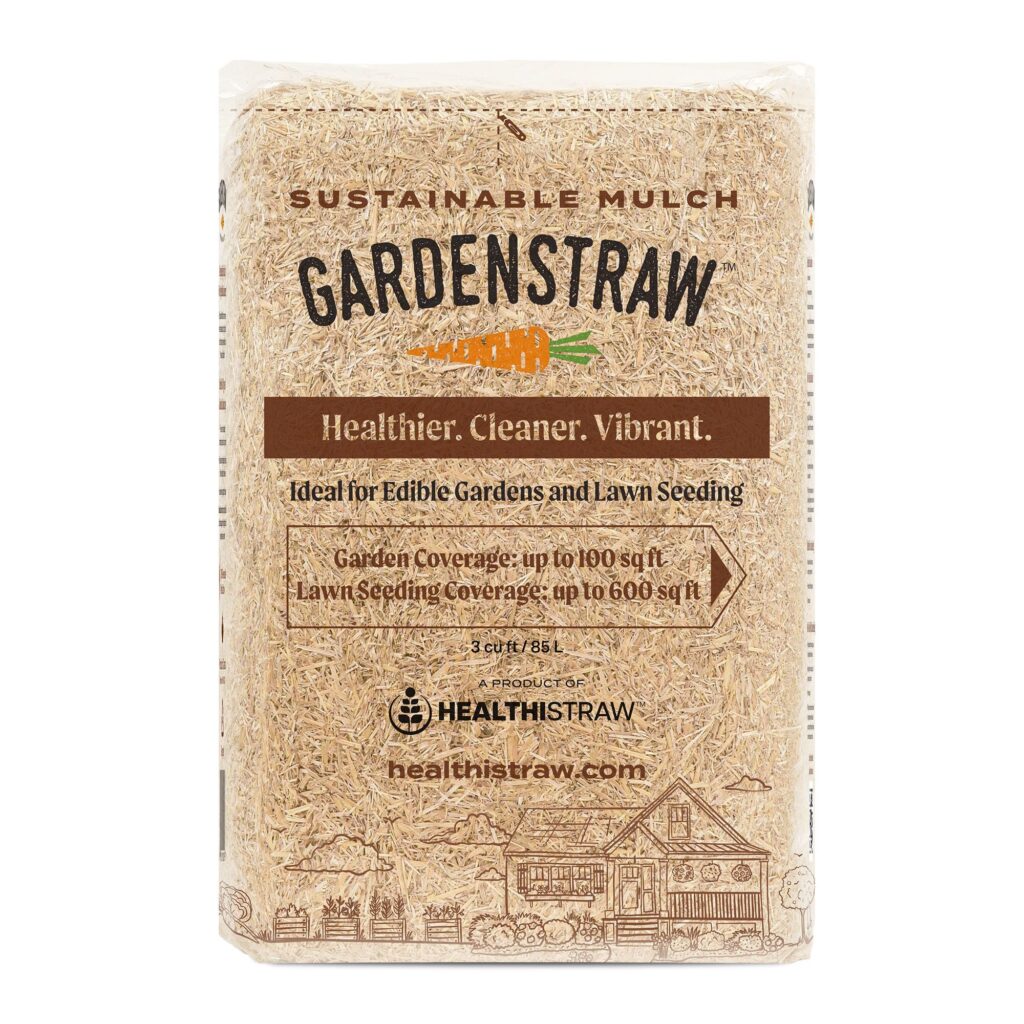
We recommend considering GardenStraw for its effectiveness in promoting vibrant gardens and conserving water.
Pros
- Made from renewable wheat straw, aiding in sustainable gardening.
- Reduces watering needs by up to 50%, perfect for temperature and moisture control.
- Biodegradable and enhances soil health without the hassle of removal.
Cons
- Some wheat seeds may sprout, requiring monitoring in the garden.
- Requires thorough watering for optimal performance.
- Availability may vary based on location, which could be a challenge.
GardenStraw is an all-natural mulch suitable for various gardening needs, including vegetable and flower gardens. Its renewable composition sets it apart, making it an eco-friendly choice. The material helps retain moisture and maintain stable soil temperatures, ultimately supporting healthier plant growth.
This product performs well in not just gardens but also for lawn seeding and patch repairs. It promotes healthier soil ecosystems by protecting against erosion and compaction. Moreover, it can simplify composting, reducing odors and enhancing nutrient cycling when added to compost bins.
While we appreciate its positives, we also acknowledge some concerns. Wheat seeds may occasionally sprout, which can be an annoyance in maintenance. Additionally, initial watering is essential for stabilizing the mulch’s position, an extra step some might not prefer. With considerations for availability in specific areas, we suggest checking local stock if you’re interested.
SuperMoss Coco Mulch
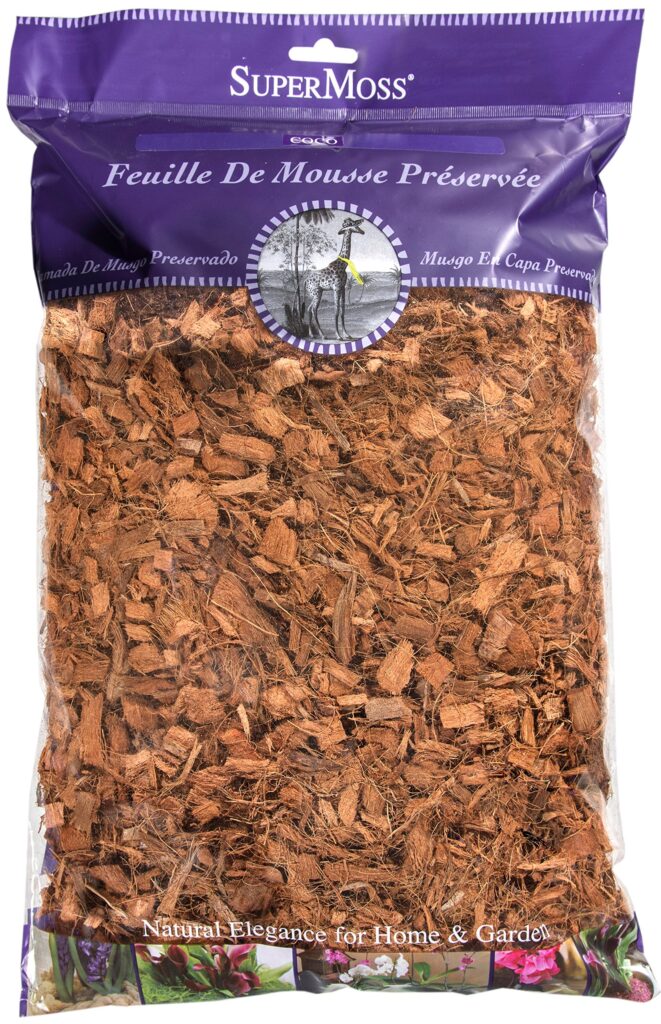
This coco mulch is an excellent pick for those seeking an eco-friendly option that promotes healthy plant growth.
Pros
- Absorbs more water to help prevent root rot.
- Naturally pH neutral and enhances aeration.
- Easy to store and long-lasting.
Cons
- Smaller quantity per bag than expected.
- Some may find it pricey for the amount received.
- Limited effectiveness for larger gardening projects.
This product stands out due to its ability to retain moisture effectively. Gardeners appreciate that SuperMoss coco mulch absorbs 33% more water than traditional peat. This feature can significantly help prevent issues like root rot, which can be detrimental to plant health.
Moreover, its pH neutrality makes it suitable for a wide range of plants. By promoting better aeration, it contributes to more vigorous root growth. Users often report seeing larger blooms and fruits when using this mulch in their gardens.
Some customers express the need for larger packaging, feeling that the quantity might fall short for extensive gardening tasks. While the quality is generally praised, the price point is a consideration, especially for those with a larger area to cover.
Scotts Deep Forest Brown Mulch
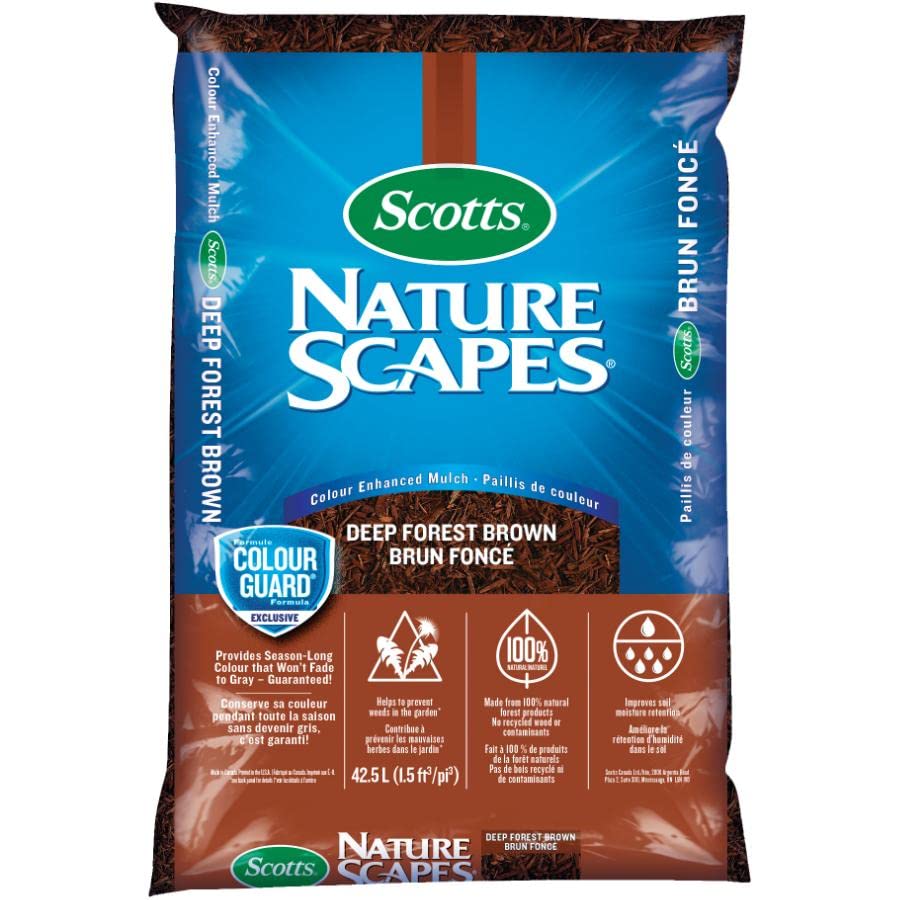
This mulch offers vibrant long-lasting color and good moisture retention, making it a solid choice for our gardens.
Pros
- Enhances aesthetics with rich, deep colors.
- Effective in weed prevention.
- Made from 100% natural forest materials.
Cons
- Color may not stay as fresh as advertised over time.
- Can be more expensive than other options.
- Might require more frequent replacement in some climates.
We appreciate products that contribute to a garden’s beauty while also supporting plant health. The Scotts Deep Forest Brown Garden Mulch excels in showcasing vibrant colors that can elevate any landscaping. With its exclusive ColourGuard Formula, it promises results that last through the season.
This mulch is not only pleasing to the eye; it also excels at moisture retention. By holding water in the soil, it aids our plants, ensuring they get the hydration they need during dry spells. This feature is especially beneficial for newly planted flowers and vegetables that require consistent moisture.
In addition to its moisture management and color, this mulch helps combat weeds, reducing the labor involved in maintaining a garden. This can be particularly advantageous for busy gardeners who want to spend more time enjoying their outdoor spaces rather than weeding. We do note that while it contains no recycled wood or contaminants, other factors such as weather and maintenance practices can influence its longevity.
Adnee Rubber Mulch Roll
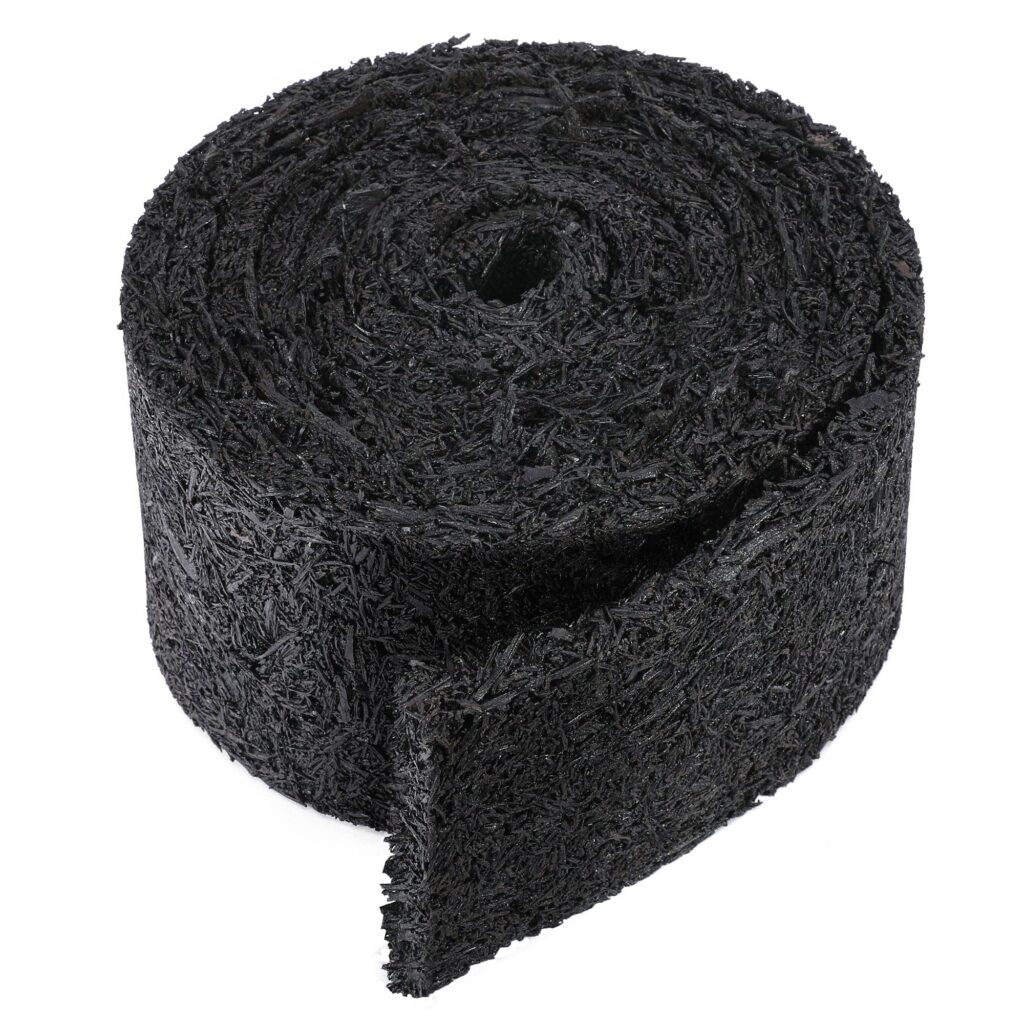
We recommend this product for those seeking a durable and aesthetically pleasing solution for landscaping.
Pros
- High durability, made from recycled rubber tires.
- Easily customizable by cutting to fit various shapes and sizes.
- Assists in reducing yard work by preventing unwanted plant growth.
Cons
- Some users report difficulty cutting the material.
- May not provide weed prevention without a backing.
- Placement can require some preparation for optimal results.
This rubber mulch roll presents a reliable option for enhancing outdoor spaces with a lasting solution. Constructed from recycled rubber tires, it withstands various weather conditions while maintaining its appearance. We appreciate its ability to last for years without needing frequent replacement, saving both time and money.
Customization is a standout feature. Its cutting capability allows us to adjust it according to our garden’s unique layout. This flexibility facilitates easy installation around flowers, plants, and trees, ensuring a neat edge.
On the downside, a few users have noted challenges when trying to cut the mulch for precise placements. Additionally, it lacks backing, which some may find essential for weed prevention. While it’s certainly functional, planning for proper installation can enhance the overall effectiveness.
Soil Sunrise Pine Bark Mulch
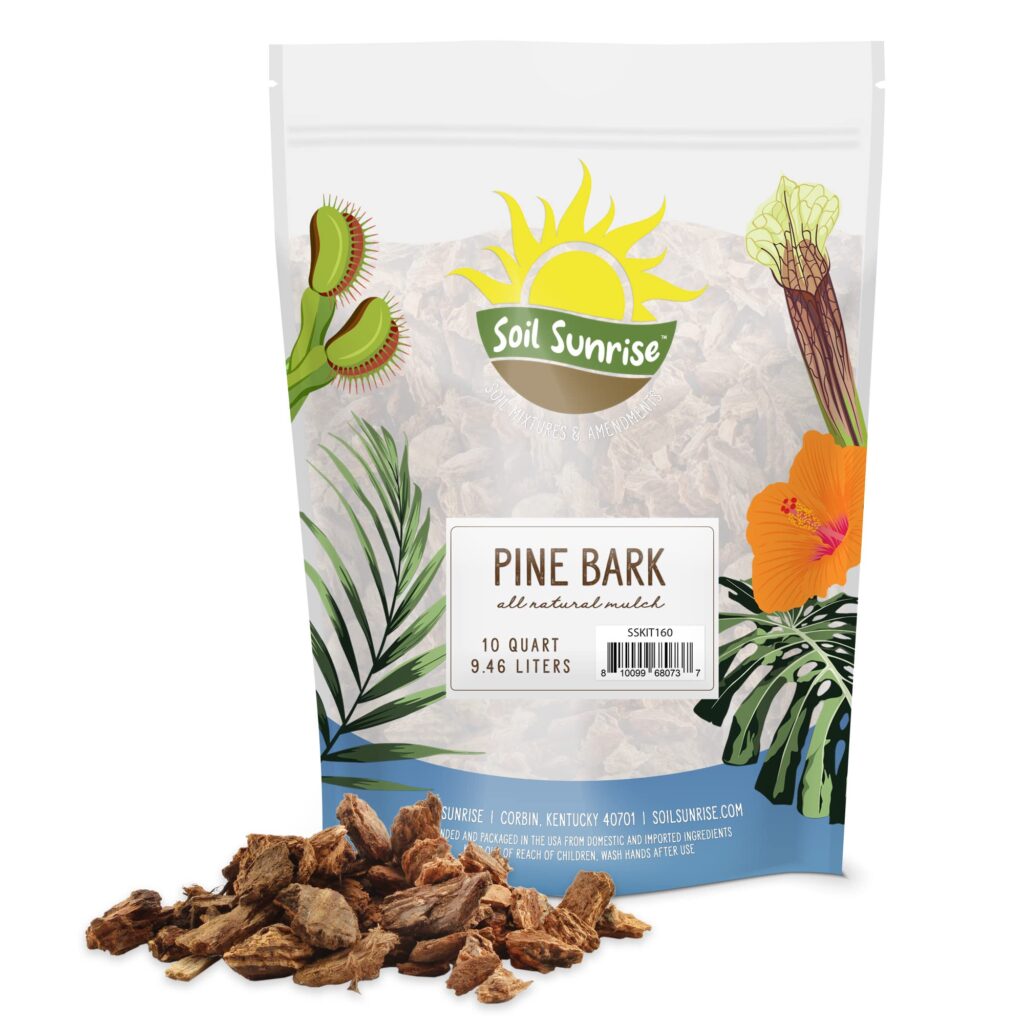
This product is a solid choice for those looking for an organic mulch option that supports plant health and aesthetics.
Pros
- Made from all-natural ingredients, free of chemicals.
- Effective for water retention and improving drainage.
- Versatile use for various gardening needs, indoors or outdoors.
Cons
- Smaller bag size may require multiple purchases for larger areas.
- Some customers noted variability in the appearance of the mulch pieces.
- Limited to specific types of gardening tasks, such as container plants.
The Soil Sunrise mulch consists entirely of 100% pine bark, ensuring no added fertilizers or pesticides. The individual chips are around 1/2 inch in size, making them suitable for a variety of applications like houseplants, landscaping, and even bonsai care. This mulch enhances appearance while also performing practical functions such as blocking pests and retaining moisture.
Using this mulch can improve the visual appeal of indoor and outdoor plants. Its natural composition encourages healthy soil conditions, which is essential for plant growth. Additionally, it is easy to handle and apply, making it a favorite among both novice and experienced gardeners.
While it effectively serves its purpose, it’s worth considering that the 10-quart size may not be enough for substantial coverage. Gardeners with larger areas might find themselves needing more than one bag, which could add to overall costs. Overall, this product offers a reliable, eco-friendly choice for enhancing plant health and soil quality.
Buying Guide
When selecting the best garden mulch, there are several important factors to consider.
Types of Mulch
We can categorize garden mulch into different types:
| Type | Description |
|---|---|
| Organic | Made from natural materials, enriches soil over time. |
| Inorganic | Made from synthetic materials, more durable. |
Purpose of Mulch
Understanding the purpose helps guide our choice:
- Weed suppression: Certain mulches create barriers that inhibit weed growth.
- Moisture retention: Mulch helps keep soil moist by slowing evaporation.
- Aesthetic appeal: Different colors and textures can enhance garden looks.
Material Considerations
When choosing mulch, consider the material’s characteristics:
- Durability: How long will the mulch last before breaking down?
- Nutritional benefits: Does it add nutrients as it decomposes?
- Color retention: Will it fade quickly in sunlight?
Application Thickness
Finally, the thickness we apply is crucial:
- 2-3 inches for most garden beds.
- 4-6 inches for areas needing extra weed control.
Evaluating these factors will help us select the right mulch for our garden needs.
Frequently Asked Questions
We often encounter questions regarding mulch choices and their impacts on gardens. Understanding these aspects can enhance our gardening experience and outcomes.
What is the best type of mulch to use in a vegetable garden?
For vegetable gardens, we recommend using organic mulches such as straw, wood chips, or grass clippings. These materials break down over time, adding nutrients to the soil. Additionally, they help retain moisture and regulate soil temperature.
Which mulch varieties are most effective at suppressing weeds?
Mulches like wood chips, shredded bark, and straw are effective at suppressing weeds. They create a barrier that blocks sunlight, preventing weed seed germination. A layer of 2-4 inches is typically sufficient for optimal effectiveness.
Are there any mulches that should be avoided in gardens, and if so, which ones?
We should avoid using dyed mulches, as they can contain harmful chemicals. Additionally, large pieces of wood or fresh sawdust can tie up nitrogen in the soil as they decompose. These choices can negatively impact plant health.
What are the benefits of using organic mulch in vegetable gardens?
Using organic mulch provides numerous benefits. It improves soil health by adding organic matter as it breaks down. It also conserves moisture, reduces soil erosion, and minimizes temperature fluctuations, which is especially beneficial during extreme weather.
How does mulch affect the longevity and health of perennial plants?
Mulch plays a crucial role in enhancing the longevity of perennial plants. It insulates the roots against temperature extremes and retains moisture. This consistent environment supports overall health and growth, contributing to the resilience of perennials.
Is it safe to use commercially bagged mulch in vegetable gardens, and are there any considerations?
When using commercially bagged mulch, we should check for certifications and avoid products with additives or pesticides. Ensuring that the mulch is free of contaminants is essential for maintaining a healthy garden. Additionally, using mulch that is suitable for edible plants is critical.
